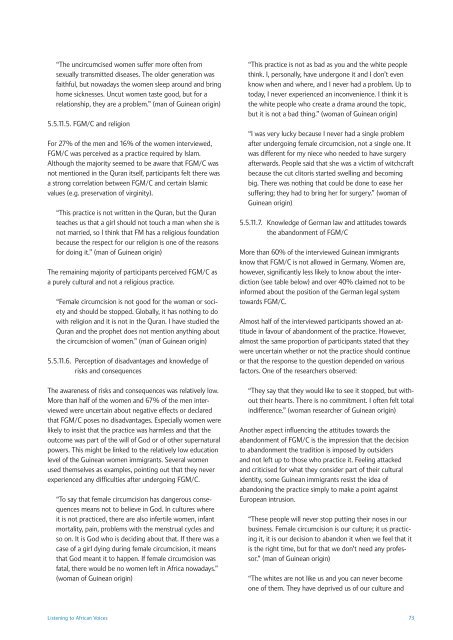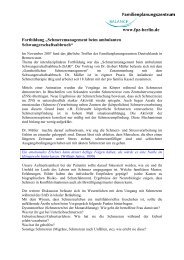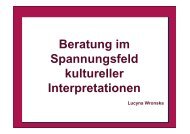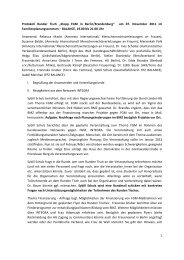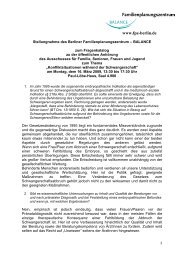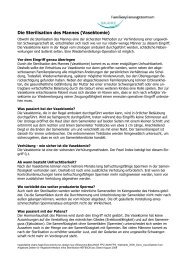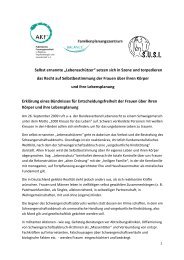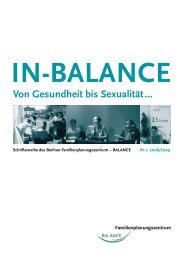Listening to African Voices - FPZ
Listening to African Voices - FPZ
Listening to African Voices - FPZ
Create successful ePaper yourself
Turn your PDF publications into a flip-book with our unique Google optimized e-Paper software.
“The uncircumcised women suffer more often fromsexually transmitted diseases. The older generation wasfaithful, but nowadays the women sleep around and bringhome sicknesses. Uncut women taste good, but for arelationship, they are a problem.” (man of Guinean origin)5.5.11.5. FGM/C and religionFor 27% of the men and 16% of the women interviewed,FGM/C was perceived as a practice required by Islam.Although the majority seemed <strong>to</strong> be aware that FGM/C wasnot mentioned in the Quran itself, participants felt there wasa strong correlation between FGM/C and certain Islamicvalues (e.g. preservation of virginity).“This practice is not written in the Quran, but the Quranteaches us that a girl should not <strong>to</strong>uch a man when she isnot married, so I think that FM has a religious foundationbecause the respect for our religion is one of the reasonsfor doing it.” (man of Guinean origin)The remaining majority of participants perceived FGM/C asa purely cultural and not a religious practice.“Female circumcision is not good for the woman or societyand should be s<strong>to</strong>pped. Globally, it has nothing <strong>to</strong> dowith religion and it is not in the Quran. I have studied theQuran and the prophet does not mention anything aboutthe circumcision of women.” (man of Guinean origin)5.5.11.6. Perception of disadvantages and knowledge ofrisks and consequencesThe awareness of risks and consequences was relatively low.More than half of the women and 67% of the men interviewedwere uncertain about negative effects or declaredthat FGM/C poses no disadvantages. Especially women werelikely <strong>to</strong> insist that the practice was harmless and that theoutcome was part of the will of God or of other supernaturalpowers. This might be linked <strong>to</strong> the relatively low educationlevel of the Guinean women immigrants. Several womenused themselves as examples, pointing out that they neverexperienced any difficulties after undergoing FGM/C.“To say that female circumcision has dangerous consequencesmeans not <strong>to</strong> believe in God. In cultures whereit is not practiced, there are also infertile women, infantmortality, pain, problems with the menstrual cycles andso on. It is God who is deciding about that. If there was acase of a girl dying during female circumcision, it meansthat God meant it <strong>to</strong> happen. If female circumcision wasfatal, there would be no women left in Africa nowadays.”(woman of Guinean origin)“This practice is not as bad as you and the white peoplethink. I, personally, have undergone it and I don’t evenknow when and where, and I never had a problem. Up <strong>to</strong><strong>to</strong>day, I never experienced an inconvenience. I think it isthe white people who create a drama around the <strong>to</strong>pic,but it is not a bad thing.” (woman of Guinean origin)“I was very lucky because I never had a single problemafter undergoing female circumcision, not a single one. Itwas different for my niece who needed <strong>to</strong> have surgeryafterwards. People said that she was a victim of witchcraftbecause the cut cli<strong>to</strong>ris started swelling and becomingbig. There was nothing that could be done <strong>to</strong> ease hersuffering; they had <strong>to</strong> bring her for surgery.” (woman ofGuinean origin)5.5.11.7. Knowledge of German law and attitudes <strong>to</strong>wardsthe abandonment of FGM/CMore than 60% of the interviewed Guinean immigrantsknow that FGM/C is not allowed in Germany. Women are,however, significantly less likely <strong>to</strong> know about the interdiction(see table below) and over 40% claimed not <strong>to</strong> beinformed about the position of the German legal system<strong>to</strong>wards FGM/C.Almost half of the interviewed participants showed an attitudein favour of abandonment of the practice. However,almost the same proportion of participants stated that theywere uncertain whether or not the practice should continueor that the response <strong>to</strong> the question depended on variousfac<strong>to</strong>rs. One of the researchers observed:“They say that they would like <strong>to</strong> see it s<strong>to</strong>pped, but withouttheir hearts. There is no commitment. I often felt <strong>to</strong>talindifference.” (woman researcher of Guinean origin)Another aspect infl uencing the attitudes <strong>to</strong>wards theabandonment of FGM/C is the impression that the decision<strong>to</strong> abandonment the tradition is imposed by outsidersand not left up <strong>to</strong> those who practice it. Feeling attackedand criticised for what they consider part of their culturalidentity, some Guinean immigrants resist the idea ofabandoning the practice simply <strong>to</strong> make a point againstEuropean intrusion.“These people will never s<strong>to</strong>p putting their noses in ourbusiness. Female circumcision is our culture; it us practicingit, it is our decision <strong>to</strong> abandon it when we feel that itis the right time, but for that we don’t need any professor.”(man of Guinean origin)“The whites are not like us and you can never becomeone of them. They have deprived us of our culture and<strong>Listening</strong> <strong>to</strong> <strong>African</strong> <strong>Voices</strong> 73


